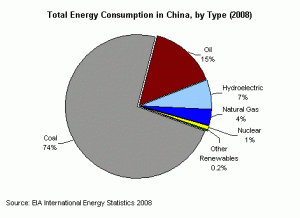 Another area where China leads the green charge is in energy consumption or 能源消耗 (néng yuán xiāo hào). While China’s population or 人口 (rén kǒu) on aggregate accounts for China’s status as the worlds largest producer of green house emissions, per capita China is quite efficient at the use and rationing of domestic energy and for good reason. If the whole population of China was as wasteful in consumption of electricity, heat and water resources as the west, global energy supply shortages would be commonplace.
Another area where China leads the green charge is in energy consumption or 能源消耗 (néng yuán xiāo hào). While China’s population or 人口 (rén kǒu) on aggregate accounts for China’s status as the worlds largest producer of green house emissions, per capita China is quite efficient at the use and rationing of domestic energy and for good reason. If the whole population of China was as wasteful in consumption of electricity, heat and water resources as the west, global energy supply shortages would be commonplace.
Per-capita, China expends roughly one fifth as much energy as the United States. Less than 20% of people own cars in China, compared to about 85% in the US. There aren’t many mega-mansions or suburban areas, so apartment complexes are efficiently packed and built to conserve energy. But on top of all this, Chinese people just plain like to save energy–whether it’s making sure every light is turned off in every room, or refusing to turn on the heat until mid-December.
But aside from house hold attempts and saving a few kuai, now the Chinese government is incentivizing conservation while seeking renewable alternatives to coal and fossil fuel energy. As China continues to modernize, per-capita GDP will continue to rise.
http://www.youtube.com/watch?v=ATybfZFkT8U
Here are some vocab words relating to conserving energy:
关灯 (guān dēng): turn off/turn off light
保存 (bǎo cún): conserve/preserve
空调 (kōng tiáo): air conditioning (AC)
暖气机 (nuǎn qì jī):heater/radiator
电表 (diàn biǎo): electric meter






Comments:
Peter Simon:
Excellent, and very true! The link leads on to other, very interesting TV debates about Chinese economic progress, etc.
I’d like to add things on the personal level. 5 years ago I spent about 300 plus kuai each winter month in Zhejiang on heating, while my Ch. neighbours almost nothing. They all had ‘kongtiao’, but that’s because it was a modern thing. They didn’t use it for heating, which is reasonable because it’s very inefficient (warm air doesn’t come down – I used small electric stoves on the floor), but they opened windows saying the rooms would get stuffy. They didn’t use it for cooling in the 35-plus summer period either. Suffering is perhaps preferable. Other than that, throwing out 300 kuai per month is not really affordable for people with less than a thousand. But for people of much better means, using huge cars is chic – in fact, it’s almost impossible to buy small cars that half of Europe uses. Highways are expensive, but petrol is cheap, trains are cheap, so the big cars are used inside or between towns locally, not for long distances – outright waste (coaches and buses are also cheap). As car sales grew around 40% a year back then, I can imagine how much more pollution they may create in slow-moving inner-city traffic in a couple of years. Beijing may have been cleared up for the olympics, but I guess Hangzhou and similar megapolises are now unbearable for a westerner. Except if they also have underground systems.
The industrial wasting is another story, I’m glad about them trying to get a bit greener – high time. And also for the USA to clear up their pollution – that’s massive! They don’t feel it so much only because they are … yes, small – with a population of a quarter of that of China on a similarly large territory, and with much smaller cities – nearly every province has 2-3 cities bigger than Chicago, and New York could come in no.6 or 8 in China.